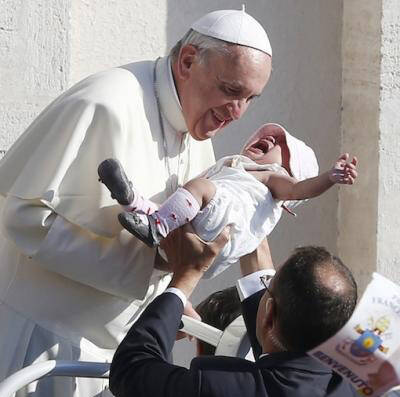After reading news reports about the interview with Pope Francis, I read the full text, which I wholeheartedly recommend you do for yourself. What struck me initially were the breadth and depth of the pope's remarks in addressing the sweeping questions the editors put to him. Instead of centering on the church's "obsession," as the pope put it, with contraception, divorce and remarriage, abortion, homosexuality and same-sex marriage, the text ranges widely. It reveals the pope's joyful engagement with this world, its people and culture. “God is in every person’s life,” Pope Francis declares, with no exceptions. And God is in our own history.
In reading the entire interview, one glimpses the pope as an inquisitive child, as a young man called to the priesthood, as a priest with so much potential that he was promoted to leadership too early and made some mistakes in governance. His authoritarian style, he admits, made him seem right-wing. From his mistakes, however, he has learned to listen, to value collaboration and to practice discernment. The pope reveals himself as a complex person. He is a holy man of prayer, an empathetic pastor, a discerning Jesuit, a family man deeply influenced by his grandmother and a loving father who as “il papa” eagerly cares for his “children” in the church. He is also the director of a field hospital whose mission is to heal the world's wounded with the Gospel. Though troubled by war, poverty and injustice, he remains full of mercy and hope.
That said, it seems to me that the media's convergence on a single point from this long interview as “the news”—namely, the pope's desire to change (or at least put on hold) the church's obsession with moral condemnations of sex-related sins—confirms the pope's insight that the church's priorities urgently need fixing. Pope Francis gets it. He understands what’s vital: how others see the church and why that matters; what the contemporary world needs from the church; how the People of God together ensure the faith (infallibly, he says); what synods and local bishops' conferences could contribute, if empowered; and how the Curia should help church leaders rather than run the church. Hooray!
Even if only a few of these insights were to be actualized, the church would be improved immensely. Some doors and windows might be opened again, a welcome mat rolled out. If it is not too late, young people might even give the church a look. (Watch out for the spin and backlash, though, as others seek to reinterpret the pope's words for their own purposes. It has already begun.)
What strikes me as most lasting is the pope's personal example. Like Francis, the beloved saint, Pope Francis seems truly to love the people of this world. He embodies the compassion of Jesus, which attracts followers, not just fans, and changes lives. This pope wants to walk with us, says he needs us to be his “community." And this same pope who relishes great art, books, films and music has an ear attuned to the cry of the poor and wants to serve them. History will remember that.








